
King Lear is a tragedy written by William Shakespeare. It is loosely based on the mythological Leir of Britain. King Lear, in preparation for his old age, divides his power and land between his daughters Goneril and Regan, who pay homage to gain favour, feigning love. The King's third daughter, Cordelia, is offered a third of his kingdom also, but refuses to be insincere in her praise and affection. She instead offers the respect of a daughter and is disowned by Lear who seeks flattery. Regan and Goneril subsequently break promises to host Lear and his entourage, so he opts to become homeless and destitute, goes insane, and the French King married to Cordelia invades Britain to restore order and Lear's rule. In a subplot, Edmund, the illegitimate son of Gloucester, betrays his brother and father. Tragically, Lear, Cordelia and several other main characters die.

Sir Herbert Beerbohm Tree was an English actor and theatre manager.

Sir Kenneth Charles Branagh is a British actor and filmmaker. Born in Belfast and raised primarily in Reading, Berkshire, Branagh trained at London's Royal Academy of Dramatic Art and served as its president from 2015 to 2024. His accolades include an Academy Award, four BAFTAs, two Emmy Awards, a Golden Globe Award, a Screen Actors Guild Award, and an Olivier Award. He was appointed a Knight Bachelor in the 2012 Birthday Honours, and was given Freedom of the City in his native Belfast in 2018. In 2020, he was ranked in 20th place on The Irish Times' list of Ireland's greatest film actors.

Sir Arthur Wing Pinero was an English playwright and, early in his career, actor.

Sir Derek George Jacobi is an English actor. Jacobi is known for his work at the Royal National Theatre and for his film and television roles. He has received numerous accolades including a BAFTA Award, two Olivier Awards, two Primetime Emmy Awards, two Screen Actors Guild Awards, and a Tony Award. He was given a knighthood for his services to theatre by Queen Elizabeth II in 1994.
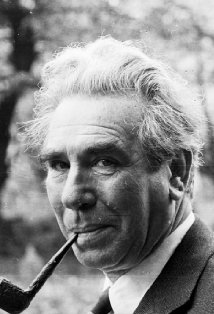
Sir Donald Wolfit, CBE was an English actor-manager, known for his touring productions of Shakespeare. He was especially renowned for his portrayal of King Lear.

Dame Alice Ellen Terry was a leading English actress of the late 19th and early 20th centuries.

The Second Mrs. Tanqueray is a problem play by Arthur Wing Pinero. It utilises the "Woman with a past" plot, popular in nineteenth century melodrama. The play was first produced in 1893 by the actor-manager George Alexander and despite causing some shock to his audiences by its scandalous subject it was a box-office success, and was revived in London and New York in many productions during the 20th century.

Sir Henry Irving, christened John Henry Brodribb, sometimes known as J. H. Irving, was an English stage actor in the Victorian era, known as an actor-manager because he took complete responsibility for season after season at the West End's Lyceum Theatre, establishing himself and his company as representative of English classical theatre. In 1895 he became the first actor to be awarded a knighthood, indicating full acceptance into the higher circles of British society.
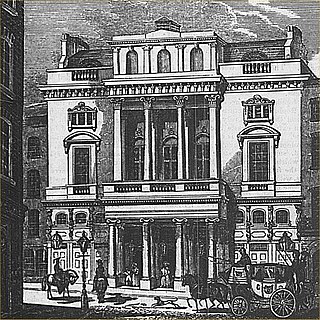
The St James's Theatre was in King Street, St James's, London. It opened in 1835 and was demolished in 1957. The theatre was conceived by and built for a popular singer, John Braham; it lost money and after three seasons he retired. A succession of managements over the next forty years also failed to make it a commercial success, and the St James's acquired a reputation as an unlucky theatre. It was not until 1879–1888, under the management of the actors John Hare and Madge and W. H. Kendal that the theatre began to prosper.
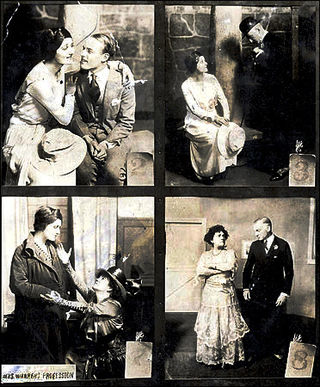
Mrs. Warren's Profession is a play written by George Bernard Shaw in 1893, and first performed in London in 1902. It is one of the three plays Shaw published as Plays Unpleasant in 1898, alongside The Philanderer and Widowers' Houses. The play is about a former prostitute, now a madam, who attempts to come to terms with her disapproving daughter. It is a problem play, offering social commentary to illustrate the idea that the act of prostitution was not caused by moral failure but by economic necessity. Elements of the play were borrowed from Shaw's 1882 novel Cashel Byron's Profession, about a man who becomes a boxer due to limited employment opportunities.

Nineteenth-century theatre describes a wide range of movements in the theatrical culture of Europe and the United States in the 19th century. In the West, they include Romanticism, melodrama, the well-made plays of Scribe and Sardou, the farces of Feydeau, the problem plays of Naturalism and Realism, Wagner's operatic Gesamtkunstwerk, Gilbert and Sullivan's plays and operas, Wilde's drawing-room comedies, Symbolism, and proto-Expressionism in the late works of August Strindberg and Henrik Ibsen.
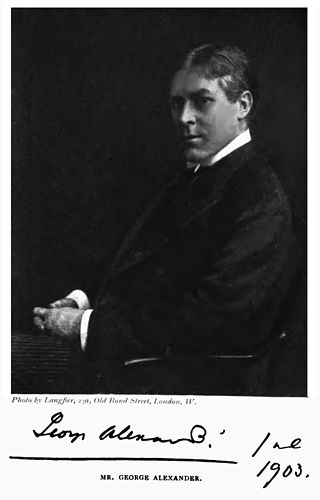
Sir George Alexander, born George Alexander Gibb Samson, was an English stage actor, theatre producer and theatre manager. After acting on stage as an amateur he turned professional in 1879 and, over the next eleven years, he gained experience with leading producers and actor-managers, including Tom Robertson, Henry Irving and Madge and W. H. Kendal.

Dame Madge Kendal was an English actress of the Victorian and Edwardian eras, best known for her roles in Shakespeare and English comedies. Together with her husband, W. H. Kendal , she became an important theatre manager.
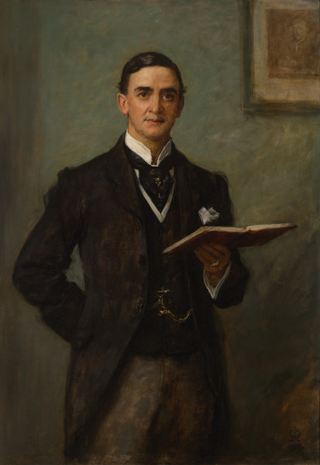
Sir John Hare, born John Joseph Fairs, was an English actor and theatre manager of the later 19th– and early 20th centuries.
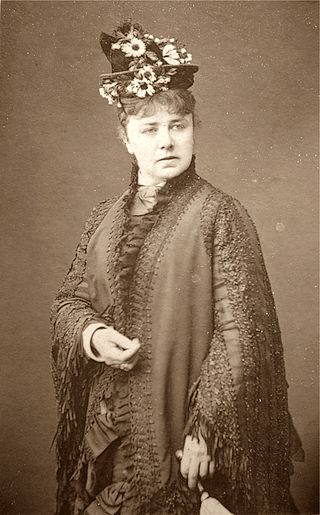
Marie Effie Wilton, Lady Bancroft (1836–1921) was an English actress and theatre manager. She appeared onstage as Marie Wilton until after her marriage in December 1867 to Squire Bancroft, when she adopted his last name. Bancroft and her husband were important in the development of Victorian era theatre through their presentation of innovative plays at the London theatres that they managed, first the Prince of Wales's Theatre and later the Haymarket Theatre.

Thousands of performances of William Shakespeare's plays have been staged since the end of the 16th century. While Shakespeare was alive, many of his greatest plays were performed by the Lord Chamberlain's Men and King's Men acting companies at the Globe and Blackfriars Theatres. Among the actors of these original performances were Richard Burbage, Richard Cowley, and William Kempe.
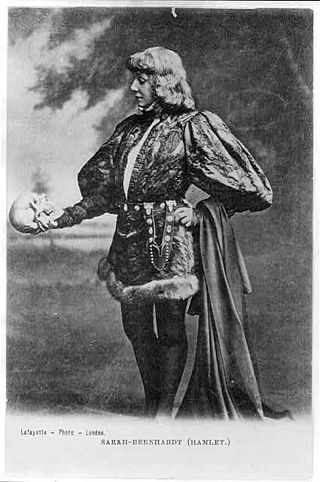
Hamlet by William Shakespeare has been performed many times since the beginning of the 17th century.

An actor or actress is a person who portrays a character in a production. The actor performs "in the flesh" in the traditional medium of the theatre or in modern media such as film, radio, and television. The analogous Greek term is ὑποκριτής (hupokritḗs), literally "one who answers". The actor's interpretation of a role—the art of acting—pertains to the role played, whether based on a real person or fictional character. This can also be considered an "actor's role," which was called this due to scrolls being used in the theaters. Interpretation occurs even when the actor is "playing themselves", as in some forms of experimental performance art.
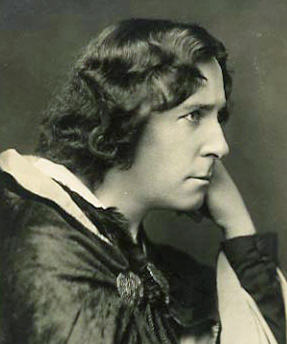
Charles Doran was an Irish actor, one of the last of the touring actor-managers in the tradition of Frank Benson, John Martin-Harvey and Ben Greet. Among those who joined his company at the start of their careers were Cecil Parker, Ralph Richardson, Francis L Sullivan and Donald Wolfit.





















